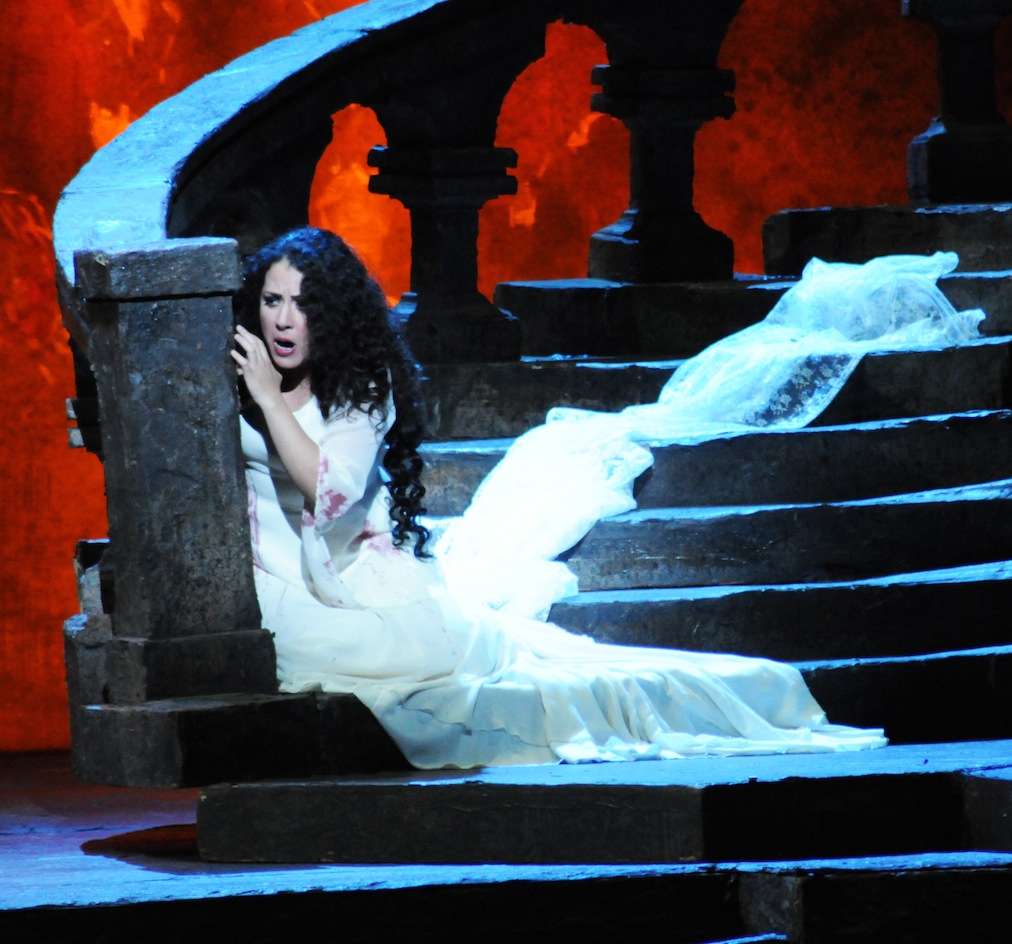|
Back
Lammermoor’s Laurels and Laments Palm Beach
Kravis Center for the Performing Arts
03/23/2012 - & March 24, 25*, 2012
Gaetano Donizetti: Lucia di Lammermoor
Maria Alejandres (Lucia di Lammermoor), Fernando Portari (Sir Edgardo di Ravenswood), Roman Burdenko (Lord Enrico Ashton), Alfred Walker (Raimondo Bidebent), R. Kenneth Stavert (Normanno), Shirin Eskandani (Alisa), Evanivaldo Correa (Lord Arturo Bucklaw)
Palm Beach Opera Chorus, Greg Ritchie (chorus master), Palm Beach Opera Orchestra, Bruno Aprea (conductor)
Massimo Gasparoni (director), Henry Bardon (scenic design), Peter J. Hall (costume design), Ron Vodicka (lighting design)

M. Alejandres (Courtesy of PB Opera)
Palm Beach Opera closed the season with what looked like a good traditional and unfussy staging of Donizetti’s most popular opera. The performance got off to a nice start with a strong male chorus and the promising Normanno of R. Kenneth Stavert from the Young Artist’s Program. A basically solid baritone, Roman Burdenko, as Lucia’s brother, Enrico gave further hope that the evening was destined to be above average. Early into the fountain scene it was evident that Maria Alejandres was about to give a performance unlike anyone had heard. Oh, appreciation of particular voices is simply a matter of taste but with Alejandres the approach to this demanding role had a stamp most of us may have never thought possible. This Lucia was not going to be the wet dishrag to whom we have become accustomed. Alejandres’ dark tone makes Lucia not a young innocent girl but a smart young woman. Though Lucia is still a victim, this time she puts up a good fight; she is a rebel and will not be bullied by her big brother without forcing him do some exceptionally intense conniving.
So with a gutsy leading lady playing a gutsy girl, why didn’t the performance soar? Simply because no Lucia di Lammermoor can be sufficiently effective without solid performances from all four leads. This is an ensemble piece; it isn’t just a star turn with small secondary roles. Characters other than the title one must be believable not just to move the story but to make us want to understand their strange behavior.
The biggest fault with this performance, as has been so often the case for the last 30 years or more, was not the soprano but the tenor. Here Fernando Portari makes his entrance at the end of the first act and we get an immediate sense that things are not going to continue as smoothly as they did when Ms. Alejandres was in charge alone. A dry sound with no legato makes it difficult to create a romantic bond. When Portari begins the sextet, again, there is no richness of tone and the excited anticipation quickly disappears. Palm Beach Opera strangely chose to include the Wolf’s Crag scene. But if you don’t have a really good tenor, it adds nothing; in fact, it makes the performance drag because the text for this scene really doesn’t add much to the drama and the music is much weaker than the rest of the opera. And though the character of Raimondo is not as essential, it is troubling that his music is given with the wide vibrato of Alfred Walker making the musical line all but negligible. This character’s purpose becomes completely lost as we develop no sympathy for him being duped into Enrico’s selfish plan.
But getting back to the pluses, Burdenko made a fine and eventually quite pitiable Enrico. His rich toned voice is never forced and his moments with his sister are especially dramatic and beautifully sung. And it isn’t just in the obvious moments of histrionics that occur during her hallucinations that makes Alejandres such a dynamo; her interaction with the lovely Alicia of Shirin Eskandani indicate that this Lucia is no bubblehead; Edgardo is going to have a wife not like the average woman of the 17th century. And Enrico doesn’t find his plan to be so easily carried out with such a determined sibling.
I don’t know if it is often the case with impatient theatregoers but at this performance there was a tremendous surge for the exit doors following the mad scene. It is rude and embarrassing but who is anyone to tell someone who has spent a lot of money on a ticket that his or her behavior is not respectful? Though it was too late to return any momentum to the drama, Mr. Portari delivered a powerful last scene. Mama Rose’s credo “give ‘em a big finish and they will forgive you anything” might not work here, but this was the tenor’s finest moment and certainly let the audience know that he is an artist to be taken seriously.
As is generally the case, Bruno Aprea led a sensitively nuanced orchestra understanding the subtleties that can make a familiar work feel much fresher. Massimo Gasparoni was kind by deciding that we did not have to envision Lucia as if she were Grace Kelly or Marilyn Monroe, nor suggest that Edgardo had sent some easily deletable e-mails.
This was an event with some serious misses but a lot of very good turns. Perhaps not a memorable performance but with something as distinguished as Alejandres’ Lucia, someday we might be saying we heard her before she...
Jeff Haller
|